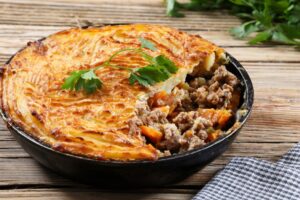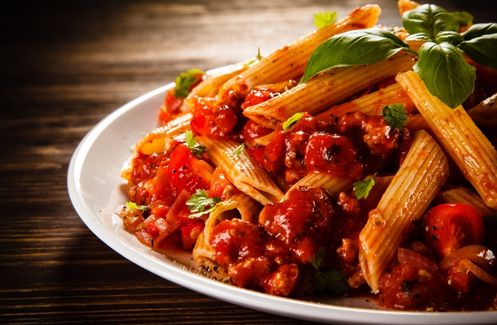Table of Contents
Will comfort eating put you in a happy & contented mood this winter? Nutritionist Rob Hobson explains how and why comfort food can boost our mood
There is plenty of evidence to show that what we eat is linked to how we feel, but the relationship is sometimes complex.
It has also been shown that many health conditions such as depression, anxiety, insomnia and PMS are affected by mood and that, in some cases addressing what you eat can help manage them.
Mood and food can also be thought of as a two-way street, as either your mood dictates what you eat or what you eat (or don’t eat) influences your mood, which may be due to an insufficient intake of certain nutrients.
What about comfort eating?
Comfort eating is common in the winter as a way of people trying to boost their mood. A recent survey by wellness brand Healthspan found that 23 per cent of those surveyed said they turn to comfort eating in the winter months to help beat winter blues.
However, comfort eating can lead to weight gain, which may negatively impact mood. The short-term effects of eating typical comfort foods may also create a state of guilt in some people.
It therefore may be helpful to redefine the meaning of comfort foods.
Comfort foods should be comforting
‘Redefining what comfort means is important as certain foods can worsen matters,’ explains Rob Hobson, Head of Nutrition at Healthspan.
‘Forget sugary foods, burgers and takeaways, as this source of comfort is short-lived and often laced with guilt. Comfort foods should be comforting, which means nurturing and nourishing you with the key nutrients that will support your health and well-being.
‘Very savoury flavours and umami are perfect and can be found in bowl foods like soups, broths, casseroles, stews and curries’.
READ MORE: 5 healthy pasta recipes perfect for the weekend

Why do we turn to comfort foods in winter?
Evolution could have something to do with this. Before we had housing, heating and other comforts, humans needed to increase their weight to keep warm.
This survival mechanism may be innate to us and is why we crave foods high in sugar and fat during winter.
Habit can also play a role as we seek foods we are familiar with. Nostalgia in certain foods remind us of our childhood, creating happy feelings.
How do our hormones play a role?
Your gut may also have a role to play, especially as research has unveiled its close relationship with the brain. Around 95 per cent of the body’s serotonin and 50 per cent of dopamine are produced in the gut.
These neurotransmitters influence mood and feelings of happiness and well-being; during digestion, complex processes that involve the brain release these chemicals.
These chemicals are also released in response to exercise and sunlight, which decline during the winter. During the winter, we may seek out certain foods that give us more of a rush to help boost our mood.
To make serotonin, the body requires an amino acid called tryptophan
Low serotonin levels may also occur during the winter when there is a lack of sunlight. It is also thought that low serotonin levels occur during the menstrual cycle, which could cause cravings.
To make serotonin, the body requires an amino acid called tryptophan. Consuming carbohydrates can help with this as it triggers the release of insulin which draws other amino acids into the body’s cells, leaving tryptophan a clear path to the brain without any competition. This may be why we crave carbohydrate foods during the colder months.
READ MORE: 5 easy grain bowl recipes for comfort food without guilt

How are certain nutrients linked to mood?
Several nutrients in the diet directly link to mood, which may result in tiredness and fatigue or increase the risk of disorders such as depression and anxiety.
Vitamin D
The primary source of this vitamin is from the sun. Research has shown that many of us have deficient levels during winter.
Low levels of the ‘sunshine vitamin’ have been associated with seasonal depression, referred to as seasonal affective disorder (SAD).
You can glean vitamin D from foods such as eggs, oily fish and fortified foods
A recent study has also shown that supplementing with vitamin D can help to reduce symptoms associated with depression.
You can glean vitamin D from foods such as eggs, oily fish and fortified foods. Mushrooms can also synthesise vitamin D from the sun, and some supermarkets now stock varieties that are rich in this nutrient.
A good strategy is to supplement once the clocks go back to boost your intake, try Healthspan Vitamin D3 Vegan Blackcurrant Gummies, £8.95.
READ MORE: 6 healthy comfort foods perfect for Autumn

B vitamins and magnesium
Both the B vitamin complex and magnesium are required for the body to convert food into energy. These nutrients are also depleted in times of stress which can lead to a decline in mood as tiredness and fatigue begin to set in.
Magnesium is essential if you are experiencing stress, as low levels can also lead to a deficiency, increasing anxiety risk. Together the depletion and deficiency create a vicious circle.
B vitamins are found in many different foods, so eating a varied diet can ensure your intake. Foods rich in magnesium include nuts, seeds, leafy greens, whole grains, beans and pulses.
READ MORE: 3 low carb dinner recipes that will actually fill you up

High-fibre foods
Low blood sugar levels can leave you feeling irritable and unable to concentrate correctly, so ensuring you eat regularly and avoid skipping meals is advisable to protect your mood.
What you choose to eat is also essential, and to retain steady blood sugar levels, you should include plenty of fibre n your meals. Fibre helps to slow down the release of glucose from the food you eat.
The type of foods you choose to eat is also essential. Switch from processed grains (white) to wholemeal and wholegrain varieties of foods such as bread, pasta and rice.
Also, include beans and pulse as these are the richest source of dietary fibre.
READ MORE: Brain food: 7 key nutrients for a healthier brain

Iron
Iron produces red blood cells responsible for carrying oxygen around the body. Low levels of iron can significantly impact your mood as it causes extreme tiredness and fatigue.
In the UK, 23 per cent of women have too little iron in their diets. You can boost your iron intake by eating red meat, oily fish, beans, nuts, dark green vegetables and dried fruit.
Planning your diet during the winter months can help you to beat the winter blues. There is nothing wrong with comfort eating but re-think the kinds of foods that are likely to bring you genuine comfort over those that are more likely to lead to weight gain and feelings of guilt.






More Stories
Get Early Access to Dwayne ‘The Rock’ Johnson’s ZOA Energy Drink at GNC.com
Avoid unnatural results with cosmetic injections
Everything to Know About Why it Happens & What to do